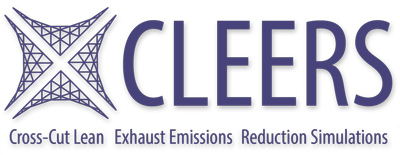Effects of Oscillatory Feed on Four-Way Catalyst Activity
Kyle Karinshak, University of Houston
Authors: Karinshak, Kyle; Kang, Sung Bong; Golden, Steve; Harold, Michael
Uncombusted methane presents a serious emissions problem for the potential adoption of Natural Gas Vehicles over gasoline and diesel vehicles; methane has a Global Warming Potential twenty times that of CO2 [1]. Traditional Three-Way Catalysts (TWCs) are ineffective for methane abatement; new catalysts are thus necessary to meet evolving emission standards. Our previous work has shown that the combination of mixed metal oxide spinel and precious group metal (PGM), can effectively convert CH4 in addition to CO, NOx, and non-methane hydrocarbons; i.e. the Four-Way Catalyst (FWC). We have also shown that a modulated feed near stoichiometry significantly enhances the overall activity of the FWC. These findings suggest that the selection of the spinel and modulation scheme has the potential for reduction in the precious metal loading at fixed temperature or light-off temperature at fixed PGM.
This study focuses on elucidating the underlying mechanism through which spinels augment the catalytic activity of spinel + PGM FWCs. This is being accomplished through parametric experiments that explore the effects of operating conditions, catalyst composition, and catalyst architecture on catalyst performance. Our results notably suggest that the spinel enhances catalytic activity even when separated from the PGM by an intermediate layer of Al2O3. Other experiments varying the modulation amplitude, frequency, and average lean/rich ratio (lambda) reveal significant enhancement in the catalyst performance. These experiments show, for instance, that increasing oscillation amplitude increases CH4 conversion over the FWC, and that increasing the period of oscillation likewise enhance performance under certain oscillation amplitudes and temperatures. Utilizing these experiments, it is our intention to detail the mechanism through which spinels enable FWC activity and develop a kinetic model of these FWCs.
Acknowledgment
This work was supported by DOE-EERE (DE-EE0008233).
[1] F. Arosio, S. Colussi, G. Groppi, A. Trovarelli, Regeneration of S-poisoned Pd/Al2O3 catalysts for the combustion of methane, Catal. Today. 117 (2006) 569–576. doi:10.1016/J.CATTOD.2006.06.006.

